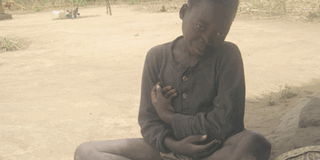What it means to suffer from Nodding Disease

14-year-old Steven Oweka at his home in Gangbar Village Palaro Sub-county in Gulu Municipality. Photo by Harriet Anena
What you need to know:
His studies have been interrupted by the nodding disease for two years now. He used to nod, get seizures, his friends avoided him but Steven Oweka believes he will resume school and become a teacher in future.
It (nodding disease) has been disturbing me for a long time. I was already in P.2 when it started. Whenever I sat down to eat, I would feel drowsy, and then I wouldn’t know what else follows.
Whenever I went to school, I would fall, and when I “wake up” (gain consciousness), I would find pupils crowded around me.
I can’t know that I am going to fall. It just happens. And when I fall (get seizures) and “wake up”, my head is usually very very heavy, so I would prefer to just lie down, or be in the same position for a while.
The falling usually takes away my energy, so my friends or teacher or my mum, usually have to hold me and help me get up or walk. I stopped going to school, because I would fall and feel dizzy every time I went to school. My friends also started avoiding me. Others would beat me. For those who would sit with me, their parents would call them away. Ma also said I should leave school until I get better.
I usually feel tired, like I have been doing a lot of work. Ma says it is because I don’t eat. So I usually stay home, seated or lying down. My two siblings stay with me.
Nowadays I feel better. I don’t fall a lot and I also eat well. I can now play with my siblings and friends. They don’t avoid me so much—because they have not seen me fall in a long time.
But when I don’t take my medication, I fall and I get injured. The doctor said I should not miss my medication. I still get chilly at night, even if I take my medicine. I hope the coldness goes away.
I think I’ll resume school next year, but I may have to repeat P. 2, since I missed school for a long time (since 2009).
But I will study because I want to become a teacher some day. I want to teach mathematics.
Mothering a nodding disease victim
It started without warning in May 2009. Steven Oweka had just returned from fetching water, sat down to eat when he started nodding.
His mother, Christine Arach, thinking he was being playful, reproved Steven, and told him to eat his food before it gets cold. But Oweka just continued nodding. That’s when Arach picked a stick and beat him.
Even though Oweka did not appear to feel the pain, his mother was convinced he just did not want to eat that day. When the nodding continued for two, three days, so did the beating, the pinching and the screaming at Oweka.
“I used to beat him every time he nods; I thought he was being funny,” says Arach.
When the nodding persisted for two weeks, especially every time food was served to the victim, his mother decided to go to the hospital.
At Gulu hospital, Arach explained her son’s condition but the medical staff just laughed it off.
“The doctors told me I was telling lies. They asked me how a child can nod when he sees food,” narrates Arach.
Arach tried to explain the phenomenon in vain that what she was telling the truth. She even challenged the nurses to bring food so that they can witness for themselves what happens to her son. They didn’t.
“I was disappointed, but there was nothing I could do,” says Arach.
The stigma
At Labworomor Camp in Palaro Sub-county, where they were still staying, parents started keeping their children away from her son.
“They thought the disease was contagious, so most families discouraged their children from playing with Oweka,” she says. When Arach left the camp for Gangbar Village in 2010, Oweka’s condition worsened.
Other than nodding and seizures, his fingers would get stiff during meal time.
“He would pick food from the plate and put it in his ears,” says Arach, “Sometimes he puts his hand in the basin instead of the plate or picks sand instead of food.”
“He was not in control of his hands anymore.”
When Arach took Oweka to the health centre, his condition was diagnosed as epilepsy. He was given a combination of Coartem, Paracetamol, Folic Acid but the effects were bad.
“Oweka would get seizures every time he took the medicine. His eyes become big as if they are going to pop out,” Arach explains.
They had to stop the medication. When he started taking a drug labelled “Phenobarb and F. A” , in November last year, his condition started stabilising.
He now goes to the health centre to get his medicine. The seizures and nodding have reduced too and he only gets them when he misses his medication.
“I didn’t think he would make it up to today. I had lost hope especially when I went to Gulu hospital and said I was lying. When I told them the symptoms, they just laughed at me and said I was lying,” says Arach.
Nodding disease in numbers
3,000
The number of children suffering from nodding disease in Gulu, Kitgum, Pader, Lamwo districts.
200
The number of children who have died of nodding disease in Acholi sub-region.
11
The number of children suffering from nodding disease in Palaro Sub-county, Gulu District.




